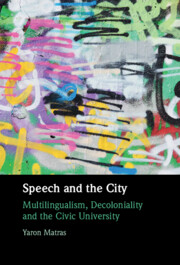Book contents
- Speech and the City
- Speech and the City
- Copyright page
- Dedication
- Contents
- Disclaimer in Regard to Website Content
- Preface
- Acknowledgements
- 1 Linguaphobia
- 2 The City as Multilingual Utopia
- 3 (Re)claiming Knowledge
- 4 Access and Agency
- 5 Heritage and Skills
- 6 Celebration and Citizenship
- 7 Academia and Advocacy
- 8 The Mirage of the Civic University
- References
- Index of Names
- Index of Subjects
4 - Access and Agency
Published online by Cambridge University Press: 23 May 2024
- Speech and the City
- Speech and the City
- Copyright page
- Dedication
- Contents
- Disclaimer in Regard to Website Content
- Preface
- Acknowledgements
- 1 Linguaphobia
- 2 The City as Multilingual Utopia
- 3 (Re)claiming Knowledge
- 4 Access and Agency
- 5 Heritage and Skills
- 6 Celebration and Citizenship
- 7 Academia and Advocacy
- 8 The Mirage of the Civic University
- References
- Index of Names
- Index of Subjects
Summary
City institutions engage with language provisions in order to ensure equal access to services. Global provisions are intertwined with local knowledge resources introduced by individual agents. As UK austerity measures post-2012 led to a reduction of resources and specialised provisions, institutions began to rely more and more on the deployment of local individualised knowledge in response to communication challenges. Multilingual spaces became in some areas improvised and driven by the agency of both institutional agents and clients. The city’s day-to-day operations can be seen as a space of resistance to monolingual ideologies, born out of the necessity to provide front-line services to all and tightly embedded into the shared experience of a multilingual reality. But city-based institutions have limited powers to legislate or to fund operations.
Keywords
- Type
- Chapter
- Information
- Speech and the CityMultilingualism, Decoloniality and the Civic University, pp. 56 - 73Publisher: Cambridge University PressPrint publication year: 2024

